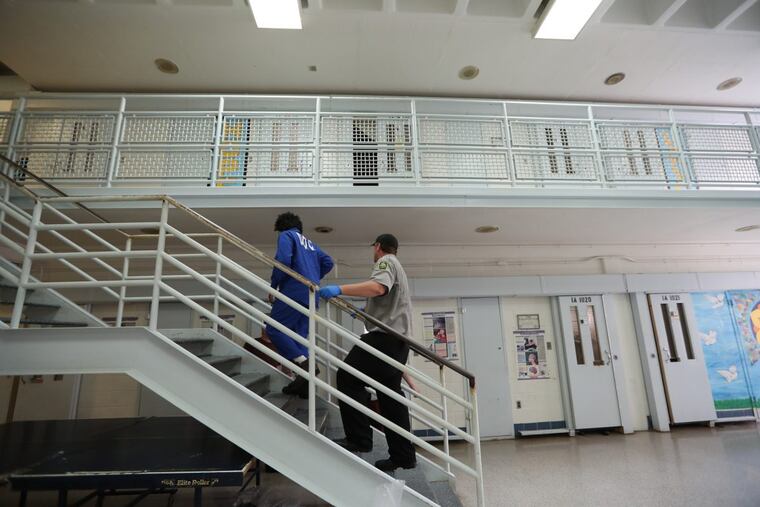Was Graterford inmate on suicide watch when he took his life? Superintendent is out, but answers scarce
Christopher Gilchrist's death was one of four suicides at Graterford in a span of five weeks. By comparison, the entire Pennsylvania Department of Corrections counted seven suicides per year on average since 2000.

Bobbie London wants answers.
The Parkesburg resident has been trying for a month to find out the truth about what happened to her son, Christopher Gilchrist, who died at Graterford Prison on Feb. 14. London says a coroner informed her that Gilchrist was on 24-hour suicide watch at the time, though the Department of Corrections (DOC) has not confirmed it. Gilchrist, who was 31, used a sheet and towel to hang himself, according to the Montgomery County Medical Examiner's Office.
"I don't understand how someone on suicide watch has the time to get that much done," London said.
Gilchrist's death was one of four suicides at Graterford in a span of five weeks, according to the Pennsylvania Department of Corrections. By comparison, the entire DOC has counted seven suicides per year on average since 2000.
Graterford Superintendent Cynthia Link has retired, DOC spokeswoman Amy Worden confirmed, though she would not provide Link's retirement date. According to news reports from last fall, Link had expected to stay on and assume the role of superintendent of SCI Phoenix, the facility built to replace Graterford and expected to open June 30.
Asked if she could confirm or deny a connection between the suicides and Link's retirement, Worden responded: "There are 17,000 employees at DOC. People retire from the DOC every day."
Laurel Harry, who was superintendent at Camp Hill state prison, is Link's interim replacement.
The move makes Link the second superintendent in a month to leave the DOC abruptly; the superintendent and deputy at Waymart state prison in northeastern Pennsylvania were replaced in February. Claire Shubik-Richards, executive director of the Pennsylvania Prison Society, said reports on Link had been generally positive.
"We observed her being truly responsive to inmate concerns, truly caring about the people whose lives were spent under her charge and a reasonable, thoughtful person who was, we observed, respected by staff and respected by incarcerated people," Shubik-Richards said.
The DOC has, in recent years, implemented numerous reforms to support the growing proportion of its population with serious mental illness, and has created suicide-prevention committees at each state institution. Those committees are meant to monitor compliance with policies, run training exercises and recommend policy updates.
Worden said in an email that DOC staff uses a suicide "checklist" to evaluate all new commitments to the system.
At least two of the inmates who took their own lives this winter were new arrivals at the prison, a factor that the DOC identifies in its policies as a trigger for increased risk of suicide.
Joan Porter, an official visitor with the Pennsylvania Prison Society, said she has often heard that newcomers are particularly at risk for self-harm. "I'm told that when young guys come in and have to face the reality of their situation, it is not uncommon for them to contemplate suicide," she said.
Porter had also heard that Gilchrist — locked up for aggravated assault in Chester County —had been on suicide watch at the time of his death. But what that means can vary.
DOC policy describes three types of observation for suicidal inmates. The most serious version requires checks every 10 minutes and the elimination of any items that could be used for self-harm. Less restrictive variations allow for approved clothing and other items based on a clinician's approval, and reduce frequency of monitoring to as little as once per half-hour.
"Usually, when you're on a suicide watch, you're in a glass cage and you don't even have clothes, so I don't see how that's possible," said Angus Love of the Pennsylvania Institutional Law Project, which with the Disability Rights Network of Pennsylvania sued the Department of Corrections over its treatment of mentally ill inmates. A settlement included a number of new suicide prevention policies; the final compliance report on that settlement, issued this January, described DOC facilities as in only partial compliance when it came to suicide prevention.
A representative of the Montgomery County Medical Examiner's Office said he could not release information about whether Gilchrist was on suicide watch. Worden said that she also could not confirm the circumstances of Gilchrist's death, and that the recent deaths at Graterford remain under investigation. The spokeswoman for the local Troop K of the Pennsylvania State Police, which investigates prison deaths, referred questions to the DOC.
London said her son should have been on suicide watch.
She had received an alarming letter from her son in January. In the letter, he told her he'd rather die than live another day in prison.
"I called up there. I said, he's not well. He's got suicidal ideation," she said. "I was told, 'We take this seriously. We'll look into it.'"
Gilchrist had attempted suicide previously, she said, and had spent time on a mental-health unit. His diagnoses included major depression and anxiety disorder, said London, who is a nurse.
"I'm not trying to blame anybody," she said. "I just don't want it to happen to somebody else."